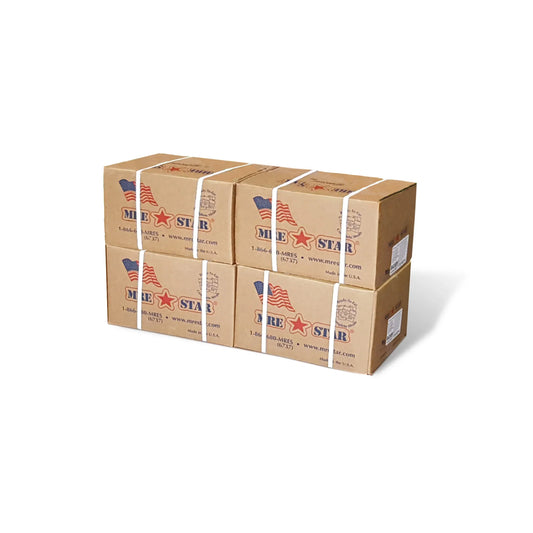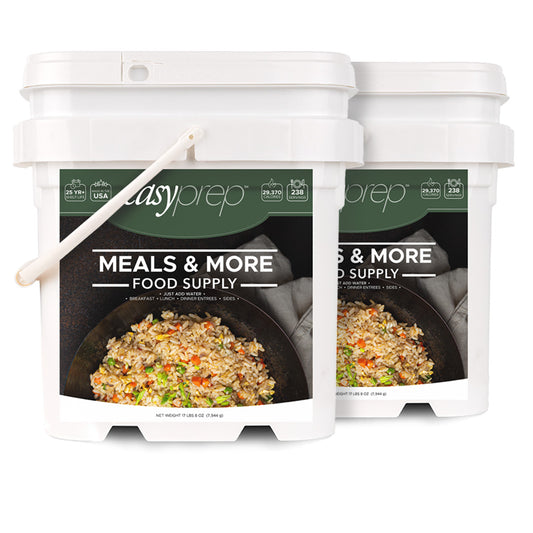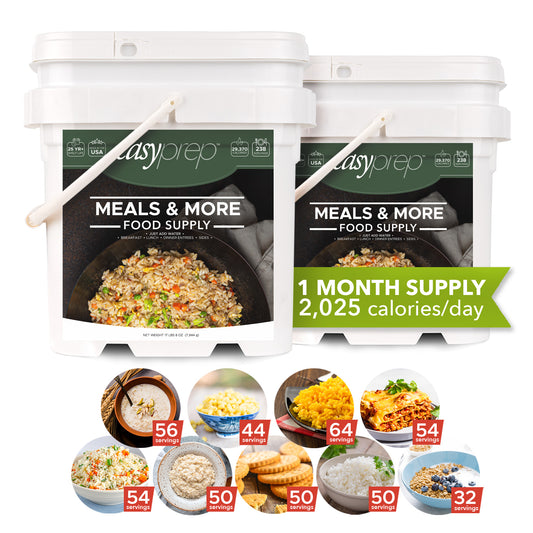Food Storage Items to Stick to While on a Budget
29 Oct 2020
More now than ever, stocking up on emergency, food/water storage, is something that everyone should consider. The year 2020 has been filled with the unexpected and who knows how long something like this will last. It is better to be prepared than not if another pandemic outbreak were to happen coming these winter months. If you are starting to being or even expand your emergency, food/water storage, sticking to a budget while doing so can help you get the things that are really needed. In this article, we will be going over the items to look for when out and about to add to that storage but also while money might be tight.
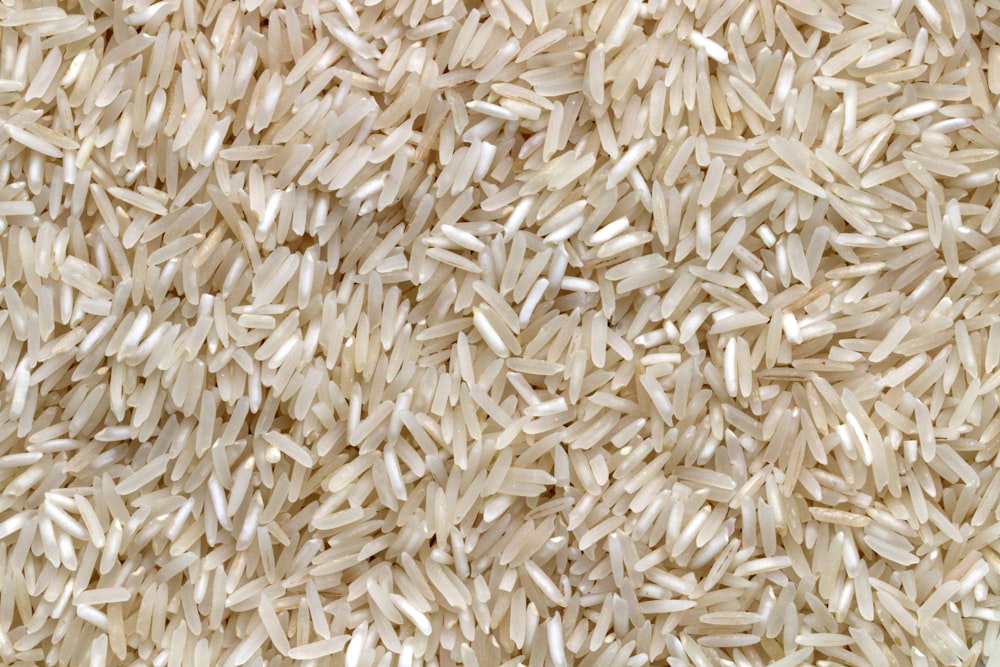 fiber can lower cholesterol and reduce your risk of heart disease and stroke. Since fiber makes you feel full, you may find it easier to maintain a healthy weight. Beans: protein is a vital nutrient that plays a key role in maintaining and repairing the body. According to research, beans are rich in polyphenols, which are a type of antioxidant. Antioxidants fight the effects of free radicals, which are damaging chemicals that the body produces during metabolism and other processes. When a person eats beans, the fiber and healthful starches
fiber can lower cholesterol and reduce your risk of heart disease and stroke. Since fiber makes you feel full, you may find it easier to maintain a healthy weight. Beans: protein is a vital nutrient that plays a key role in maintaining and repairing the body. According to research, beans are rich in polyphenols, which are a type of antioxidant. Antioxidants fight the effects of free radicals, which are damaging chemicals that the body produces during metabolism and other processes. When a person eats beans, the fiber and healthful starches  they contain can help create a feeling of fullness and satisfaction. As a long-term dietary strategy, this could help prevent overeating and may lead to weight loss. Peanut Butter: peanut butter is a fairly balanced energy source that supplies all of the three macronutrients and also a great source of protein! Flour: this can be used as a basis for bread, or other cooking. It is cheap and great to keep on hand. Pasta Noodles: often overlooked, pasta noodles are very inexpensive and very easy to prepare, requiring only boiling water.
Out of all of these foods, beans and pasta noodles are certainly the cheapest. Rice is especially affordable when you buy it in bulk from wholesale stores. Peanut butter is fairly inexpensive. Flour is great for experienced preppers as it has dozens of cooking uses.
they contain can help create a feeling of fullness and satisfaction. As a long-term dietary strategy, this could help prevent overeating and may lead to weight loss. Peanut Butter: peanut butter is a fairly balanced energy source that supplies all of the three macronutrients and also a great source of protein! Flour: this can be used as a basis for bread, or other cooking. It is cheap and great to keep on hand. Pasta Noodles: often overlooked, pasta noodles are very inexpensive and very easy to prepare, requiring only boiling water.
Out of all of these foods, beans and pasta noodles are certainly the cheapest. Rice is especially affordable when you buy it in bulk from wholesale stores. Peanut butter is fairly inexpensive. Flour is great for experienced preppers as it has dozens of cooking uses.
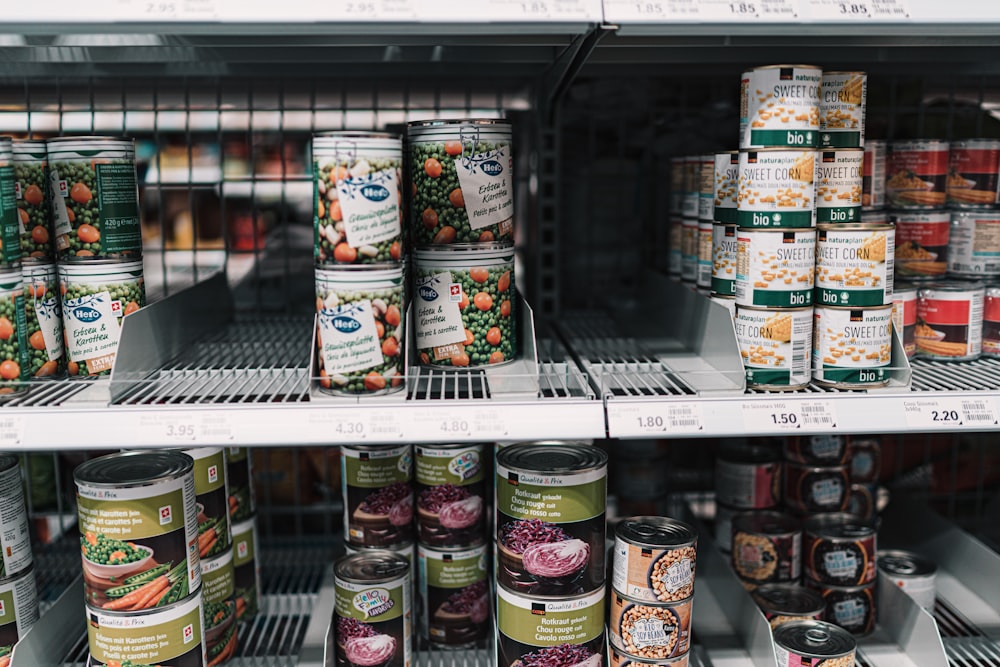 rapidly in a survival situation but can last for up to two years in cans. Buying generic brand products helps you save more money. When purchasing canned goods, you need to use them on rotation. This means you should keep a log of the use-by date and use them before that point. When you use them, replace them with more supplies to keep your stocks replenished. Starting a food storage plan with canned goods is a great way to bring someone who is not a prepper, family or friends. on board. This tactic allows for families that normally would not have extra food to easily add food to their pantry in a way that is very normal to them. Buying a few additional canned goods while you are at the grocery store is a simple first step, that could help in the long run.
Finally, when shopping for food, keep an eye out for coupons. This may mean that you purchase dozens of beans one week and tons of rice the next. However, buying small amount of canned food when out shopping, you will soon see your food supplies growing. Preparing even a little bit at a time is better than nothing at all.
rapidly in a survival situation but can last for up to two years in cans. Buying generic brand products helps you save more money. When purchasing canned goods, you need to use them on rotation. This means you should keep a log of the use-by date and use them before that point. When you use them, replace them with more supplies to keep your stocks replenished. Starting a food storage plan with canned goods is a great way to bring someone who is not a prepper, family or friends. on board. This tactic allows for families that normally would not have extra food to easily add food to their pantry in a way that is very normal to them. Buying a few additional canned goods while you are at the grocery store is a simple first step, that could help in the long run.
Finally, when shopping for food, keep an eye out for coupons. This may mean that you purchase dozens of beans one week and tons of rice the next. However, buying small amount of canned food when out shopping, you will soon see your food supplies growing. Preparing even a little bit at a time is better than nothing at all.
 Heirloom survival seed vaults which contains hundreds of great seeds with 20+ fruits and vegetables. Grow them continuously and then jar or pickle them when the time comes to harvest. Pickled foods that are well-sealed and kept at temperatures below 75 degrees can last up to three years. In addition to this, grow herbs for medicinal and taste purposes. The possibilities for gowning your own food are endless!
Sources;
doomsdayprep.com
Heirloom survival seed vaults which contains hundreds of great seeds with 20+ fruits and vegetables. Grow them continuously and then jar or pickle them when the time comes to harvest. Pickled foods that are well-sealed and kept at temperatures below 75 degrees can last up to three years. In addition to this, grow herbs for medicinal and taste purposes. The possibilities for gowning your own food are endless!
Sources;
doomsdayprep.com
Inexpensive Foods to Include in Your Food Storage
There are foods you can begin prepping with that are cheap and will provide most of the sustenance you need for a short period of time, and they are the following; Rice: fiber can lower cholesterol and reduce your risk of heart disease and stroke. Since fiber makes you feel full, you may find it easier to maintain a healthy weight. Beans: protein is a vital nutrient that plays a key role in maintaining and repairing the body. According to research, beans are rich in polyphenols, which are a type of antioxidant. Antioxidants fight the effects of free radicals, which are damaging chemicals that the body produces during metabolism and other processes. When a person eats beans, the fiber and healthful starches
fiber can lower cholesterol and reduce your risk of heart disease and stroke. Since fiber makes you feel full, you may find it easier to maintain a healthy weight. Beans: protein is a vital nutrient that plays a key role in maintaining and repairing the body. According to research, beans are rich in polyphenols, which are a type of antioxidant. Antioxidants fight the effects of free radicals, which are damaging chemicals that the body produces during metabolism and other processes. When a person eats beans, the fiber and healthful starches  they contain can help create a feeling of fullness and satisfaction. As a long-term dietary strategy, this could help prevent overeating and may lead to weight loss. Peanut Butter: peanut butter is a fairly balanced energy source that supplies all of the three macronutrients and also a great source of protein! Flour: this can be used as a basis for bread, or other cooking. It is cheap and great to keep on hand. Pasta Noodles: often overlooked, pasta noodles are very inexpensive and very easy to prepare, requiring only boiling water.
Out of all of these foods, beans and pasta noodles are certainly the cheapest. Rice is especially affordable when you buy it in bulk from wholesale stores. Peanut butter is fairly inexpensive. Flour is great for experienced preppers as it has dozens of cooking uses.
they contain can help create a feeling of fullness and satisfaction. As a long-term dietary strategy, this could help prevent overeating and may lead to weight loss. Peanut Butter: peanut butter is a fairly balanced energy source that supplies all of the three macronutrients and also a great source of protein! Flour: this can be used as a basis for bread, or other cooking. It is cheap and great to keep on hand. Pasta Noodles: often overlooked, pasta noodles are very inexpensive and very easy to prepare, requiring only boiling water.
Out of all of these foods, beans and pasta noodles are certainly the cheapest. Rice is especially affordable when you buy it in bulk from wholesale stores. Peanut butter is fairly inexpensive. Flour is great for experienced preppers as it has dozens of cooking uses.
Water Storage
Here at The Ready Store, we offer many different varieties of water containers that can be used for long-term water storage. Take a look of some of our most popular products. 5 Gallon Stackable Water Container: this container holds 5-gallons of drinking water, allowing you to stay hydrated during an emergency or stay safe if public water supplies become contaminated. Recommended amounts of water for survival fall into three different categories: Drinking, Cleaning and Hygiene, and Cooking. The Institute of Medicine advises that men should drink about 13 cups (3 liters) per day and women should drink about 9 cups (2.2 liters). About 16 ounces is recommended for cleaning and hygiene and about 32 ounces for cooking. However, the recommended 32 ounces for cooking is dependent on what types of food you have in your emergency supply. We recommend checking each item and adding the exact amount needed to get your own amount per day needed for cooking. 55- Gallon Water Barrel with Water Preserver: This 55 gallon water barrel comes with Water Preserver that will reduce water rotating from every 6 to 12 months to 5 years! Our 55-gallon water container holds almost 4 months of drinking water for one person! (1/2 gallon per day). At just under 3 feet tall and 23 inches wide, this emergency water drum safeguards 55 gallons of water. Add the included Water Preserver (made to treat 55 gallons) and you won't have to rotate the water but once every 5 years. To remove water we recommend using one of our siphons (sold separately) which will make the job easy. Simply open the top cap with a bung wrench (sold separately) and place the siphon in the water. Depending on the type of siphon you're using you will be a few moments away from getting the drinking water you need. Secure your family's health by obtaining a fresh water supply now for emergencies like earthquakes, violent storms, or contaminated public water supplies with this 55 gallon water tank.Canned Food Goods
Canned goods will become your new best friend when it comes to getting vitamins and minerals. Fruits and vegetables perish rapidly in a survival situation but can last for up to two years in cans. Buying generic brand products helps you save more money. When purchasing canned goods, you need to use them on rotation. This means you should keep a log of the use-by date and use them before that point. When you use them, replace them with more supplies to keep your stocks replenished. Starting a food storage plan with canned goods is a great way to bring someone who is not a prepper, family or friends. on board. This tactic allows for families that normally would not have extra food to easily add food to their pantry in a way that is very normal to them. Buying a few additional canned goods while you are at the grocery store is a simple first step, that could help in the long run.
Finally, when shopping for food, keep an eye out for coupons. This may mean that you purchase dozens of beans one week and tons of rice the next. However, buying small amount of canned food when out shopping, you will soon see your food supplies growing. Preparing even a little bit at a time is better than nothing at all.
rapidly in a survival situation but can last for up to two years in cans. Buying generic brand products helps you save more money. When purchasing canned goods, you need to use them on rotation. This means you should keep a log of the use-by date and use them before that point. When you use them, replace them with more supplies to keep your stocks replenished. Starting a food storage plan with canned goods is a great way to bring someone who is not a prepper, family or friends. on board. This tactic allows for families that normally would not have extra food to easily add food to their pantry in a way that is very normal to them. Buying a few additional canned goods while you are at the grocery store is a simple first step, that could help in the long run.
Finally, when shopping for food, keep an eye out for coupons. This may mean that you purchase dozens of beans one week and tons of rice the next. However, buying small amount of canned food when out shopping, you will soon see your food supplies growing. Preparing even a little bit at a time is better than nothing at all.
Become Self Sustained - Grow Your Own Food!
Growing your own fruits and vegetables is a slow and gradual process. Approach this in a smart way by purchasing a packet of seasonally relevant seeds when you first begin, which are very inexpensive. Alternatively, you could also buy one of our Heirloom survival seed vaults which contains hundreds of great seeds with 20+ fruits and vegetables. Grow them continuously and then jar or pickle them when the time comes to harvest. Pickled foods that are well-sealed and kept at temperatures below 75 degrees can last up to three years. In addition to this, grow herbs for medicinal and taste purposes. The possibilities for gowning your own food are endless!
Sources;
doomsdayprep.com
Heirloom survival seed vaults which contains hundreds of great seeds with 20+ fruits and vegetables. Grow them continuously and then jar or pickle them when the time comes to harvest. Pickled foods that are well-sealed and kept at temperatures below 75 degrees can last up to three years. In addition to this, grow herbs for medicinal and taste purposes. The possibilities for gowning your own food are endless!
Sources;
doomsdayprep.com








